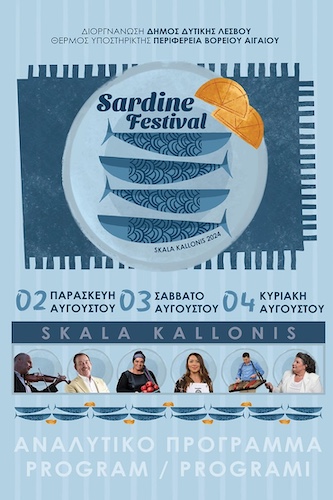The Gulf of Kalloni lies in the centre of Lesvos, about 14,000 hectares large. Its opening to the open sea is smaller than one kilometer wide, thus creating a unique eco system, fed by rivers and smaller water streams and surrounded by marshes and the salt pans where flamingos congregate. This watery world has been known since ancient times. Aristotle spent two years on the island studying its animals. (346 – 343 BCE.)*. It is now an international hot spot for birdwatchers.
As far as I know Stephen Spielberg has never been to the island, but in 1975 he made the movie Jaws, starring a sea creature previously described by Aristotle (but hopefully one that no longer belongs to the 60 kinds of fish that nowadays swim around in the Gulf of Kalloni). The impact of this horror movie about shark attacks was so big that many people developed a livelong fear for swimming in sea.
I know however that no blood-thirsty sharks swim in the Aegean Sea. Smaller sharks, ones that would not harm even a fly, can be found far out in the open sea, like school sharks (Galeorhinus galeus). It is only that they suffer the risk of finishing up on a dinner plate: Galeos. Even so, when I step into the sea, I always watch out over the water looking for that notorious black triangle cutting through the waves. Once I saw one speeding through the water and while my heart beat so hard that the predator most certainly must have heart it, I tried as quietly as possible to return to the beach. It was only when the monster made a somersault above the water that I could breath again: it was a playful dolphin.
Most sharks in this season should be in South Africa, where the biggest sardine run of the world takes place: millions of sardines swim, in schools of sometimes more than 7 kilometers long, from South Africa’s most southern point (Cape Agulhas) towards its east coast and onto Mozambique. A kind of traveling Food Festival, where sharks, dolphins and even sea birds like Northern gannets and Cormorants share the party with the excellent food.
The second biggest sardine run takes place in Mexico, around Magdalena Bay. I don’t know if there is also a Greek one. The only sardine migration known on Lesvos takes place during the Sardine Festival of Skala Kalloni when masses of sardines are fished out of the water to end on the grill.
The festival will next take place on August 2, 3 and 4. Then the best sardines of Greece will gather in the Gulf of Kalloni: the famous pappalines, whose sweet and juicy taste is attributed to the high level of minerals in the Gulf of Kalloni, whose undersea world was so long ago praised by Aristotle saying it was so much richer than any garden above.
Sardines become even more tasty when they are laid to sleep in a bed of salt for some hours. Then you get sardelles pastès, raw salted, with a near creamy taste (like the Dutch herring). The best bite to go along with a glass of ouzo: the fresh taste of this anise drink, another speciality of Lesvos, is a divine combination with the tingling salt of the fish.
However, I have been quite disappointed lately. There are no more sardines in the taverns. The few that get caught are sold for a King’s ransom in gold. Of course these prices are not caused by hungry sharks, otherwise the fishermen would have warned us. It might be due to the weeks’ long heat wave we are just recovering from. In South Africa the sardines refuse point blank to do their run when water temperature is not below 21 °C. So it may be that the temperature in the Gulf of Kalloni is too hot. The sardines may well be swarming in deeper and cooler waters around the island, until they can no longer resist the temptation of all that great food in the Gulf of Kalloni. Otherwise there will be only one sardine for each visitor on the Sardine Festival. Or none?
It is good that salting fish is an enduring Greek culinary tradition and not only sardine are forced to kiss the salt. Another popular fish (to be salted in slices) is lakerda, made from palamida (bonito), that can be obtained during all seasons. Other ones that get magically transformed into salted fish are marida (white bait) and kolios (mackerel). But a summer without sardines is no summer.
*Aristoteles Lagoon, BBC documentary by professor Armand Leroi.











